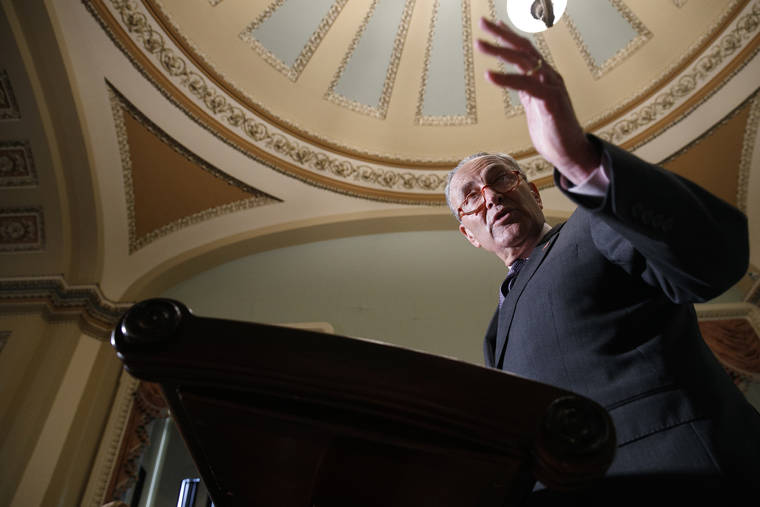NEW YORK — Democrats are embracing an impeachment investigation that could jeopardize their House majority and alienate the very suburban voters who have warmed to the party in recent elections and will be vital to defeat President Donald Trump next fall.
But a growing consensus is emerging among anxious Democrats: The risks are worth it.
Democrats were emboldened by Wednesday’s release of a rough transcript of Trump’s July call with Ukrainian President Volodymyr Zelenskiy, which confirmed that the Republican president repeatedly asked a foreign power to investigate his leading Democratic political rival, Joe Biden.
“The guy has got to be stopped,” said Democratic former Virginia Gov. Terry McAuliffe, who had previously urged Democrats to move cautiously on impeachment because the Republican-led Senate would almost certainly reject articles of impeachment.
“This is a president using presidential power to invite a foreign government to come into our country and interfere with our democracy,” McAuliffe continued. “This is too much.”
Democrats will face tremendous political peril over the next year, however — a fact underscored by a far more cautious approach from the Democratic governors of Minnesota, Pennsylvania and Wisconsin, who declined Wednesday to endorse House Speaker Nancy Pelosi’s approach.
Minnesota Gov. Tim Walz, a former congressman, called details of Trump’s phone call “deeply troubling,” but said impeachment may not be the way to go.
“It may not be politically good to do because I think at this point I, like many Minnesotans, am so sick and tired of the dysfunction in D.C.,” he told reporters.
While Congress’ timeline is yet unclear, the impeachment inquiry may well run simultaneously with the Democratic Party’s primary election calendar. The first primary votes are scheduled in early February and will run through the party’s national convention in July.
More broadly, the impeachment proceedings will serve as a constant reminder to voters across the political spectrum that Democrats are actively using one of Congress’ most sacred powers to pursue Trump.
The move is justified but inherently “dangerous,” said Bill Burton, a former adviser to President Barack Obama.
“Nobody knows how the politics are going to play out, which is why it’s so honorable that Speaker Pelosi is moving forward,” Burton said. “There comes a tipping point where Congress needs to do its job when there’s such blatant abuse of power.”
Strategists in both parties pointed to the electoral backlash against the GOP after House Republicans voted to impeach President Bill Clinton in 1998 for obstructing the investigation into his extramarital affair.
Republicans nearly lost their House majority in the next election.
And Democrats, having won a narrow House majority less than two years ago, must now spend the next 14 months protecting vulnerable freshmen in pro-Trump districts to preserve their grip on at least one chamber of Congress.
The inexperienced freshmen will be forced to explain the impeachment investigation to skeptical constituents over and over. At the same time, they will be forced to answer for Democratic presidential contenders, who have almost unanimously embraced impeachment and policy prescriptions that are sometimes out of step with moderate voters.
Biden, one of the few former holdouts on impeachment, said Tuesday that Trump “will leave Congress … with no choice but to initiate impeachment” if he doesn’t cooperate with congressional investigators. The former vice president came out with an even stronger message on Wednesday, insisting that the transcript revealed Trump had jeopardized national security.
“It is a tragedy for this country that our president put personal politics above his sacred oath,” Biden said. He added, “Congress must pursue the facts and quickly take prompt action to hold Donald Trump accountable.”
Despite the strong words, polling on impeachment has never been with the Democrats’ new position.
Multiple polls show that a majority of Americans have consistently opposed impeaching Trump. A Quinnipiac University poll released in mid-July, for example, found that 60% of registered voters opposed impeachment proceedings that could lead to Trump’s removal from office; the opposition included 29% of Democrats and 62% of independents.
The context has changed, however.
Previous polling was generally related to the exhaustive investigation into whether Trump conspired with Russia to influence the 2016 election. This one hinges on Trump’s effort to do the same with Ukraine heading into 2020.
The rough transcript released Wednesday leaves no doubt that Trump was asking the Ukrainian president to investigate Biden and Biden’s son, who served on the board of a Ukrainian energy company while Biden was vice president.
And while Democrats were outraged by details of the call, the new facts did little to sway Republican officials, who have stood behind Trump through multiple scandals and have little appetite to upset his passionate political base on the eve of the next election.
Utah Sen. Mitt Romney, who is not up for reelection until 2024, was among the only high-profile Republicans on Capitol Hill to raise concerns. He said he found the rough transcript “deeply troubling.”
The vast majority of his Republican colleagues defended Trump’s behavior. South Carolina Republican Sen. Lindsey Graham, who has been critical of Trump at times, said it was “very appropriate.”
Beyond Washington, there was evidence of continued anxiety among some longtime Democratic leaders.
Don Fowler, who served as Democratic National Committee chairman under President Bill Clinton, vividly recalls how impeachment bit the party that pursued it last time around.
“The Republicans did themselves a lot of harm by pursuing impeachment for Clinton. We Democrats face that same prospect with Donald Trump,” Fowler said. “You can have all sorts of inquiries about malfeasance in office and being stupid and mean and dirty and nasty, but that last step, impeachment, I don’t think I would take.”
———
Associated Press writers Steve Karnowski in Minneapolis, Marc Levy in Harrisburg, Pa., David Eggert in Lansing, Mich., and Hunter Woodall in Keene, N.H., contributed to this report.


